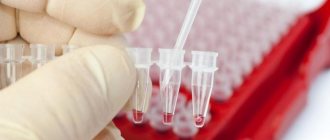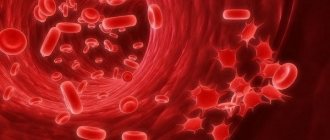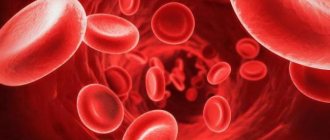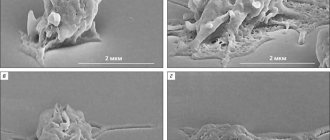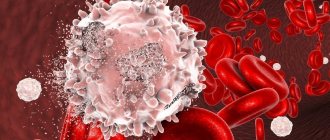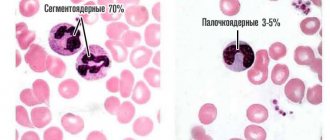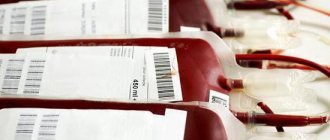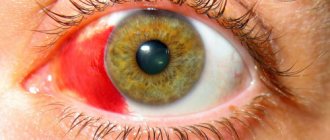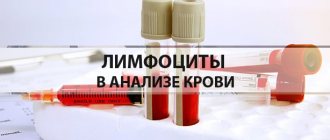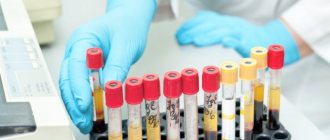The hemostatic system is complex, multicomponent and performs a lot of functions, the most important of which are stopping bleeding, maintaining blood in a liquid state, and participating in the healing of damage to organs and tissues.
It includes blood coagulation factors, biological molecules, platelets, vascular walls, as well as neurohumoral mechanisms that regulate the functioning of these factors. A disruption of the hemostasis system can occur when one or more components fail. As a result, the balance between coagulation and anticoagulation mechanisms is disrupted, with the development of certain consequences for the body.
All problems associated with bleeding disorders
Problems associated with bleeding disorders are usually caused by abnormal blood flow to block blood vessels when they are injured.
There are also genetic abnormalities that complicate the process of blood clotting. If everything is normal in the body, the blood at the site of the cut should thicken, that is, prevent heavy bleeding. However, in some cases, this mechanism does not work, which leads to large blood losses.
In addition, with poor blood clotting, its external loss does not always occur. Such disorders can manifest themselves in the form of internal bleeding, for example under the skin, causing hematomas, and even into the brain.
Clinical picture
Clinically, coagulation factor 12 deficiency is manifested by prolongation of bleeding time without any other symptoms of impaired hemostasis. The severity of prolongation of bleeding time depends on the type of inheritance of the genetic defect. In the dominant type, the deficiency is more pronounced; in the recessive type, it is partially compensated by other coagulation factors. Bleeding time is increased due to delayed initiation of the cascade coagulation system. Patients do not show a tendency to pathological bleeding, so the disease is often not detected or discovered by chance during laboratory examination or preoperative screening.
It seems a little paradoxical that with coagulation factor deficiency, it is not bleeding that manifests itself, but thrombosis. For example, John Hageman, after whom the coagulation factor is named, subsequently died from thromboembolism, which was complicated by a fracture of the pelvic bones. Modern published clinical cases of surgical interventions in patients with Hageman syndrome, fortunately, ended successfully. Thrombophilic disorders are associated with the fact that factor XII is involved in the destruction of blood clots by activating the kallikrein-kinin system. Active kallikrein not only triggers the generation of kinins that regulate inflammation, vascular tone and pain reactions, but also converts the inactive plasminogen protein into the active enzyme plasmin (fibrinolysin), which dissolves the fibrin part of the blood clot. Therefore, Hageman factor deficiency is associated with:
- thrombosis
- migrating thrombophlebitis
- thromboembolism
- heart attacks
- spontaneous abortions
Causes of bleeding disorders
Typically, poor blood clotting is caused by a deficiency of anticoagulants and other substances that ensure normal blood clotting. Such substances include proteins. In the presence of certain diseases, there may be no proteins in the plasma at all. As a rule, such diseases are hereditary, for example, hemophilia.
However, abnormal blood clotting is caused not only by genetic abnormalities, but also by several other factors, such as:
• Lack of vitamin K in the body.
• Hereditary diseases: von Willebrand disease and hemophilia.
• Liver carcinoma or the presence of metastases from other organs affected by cancer.
• Infectious liver diseases, such as hepatitis.
• Diseases that cause scarring on the liver (cirrhosis).
• Long-term use of strong antibiotics or drugs aimed at combating blood clots.
• The use of anthogenesis inhibitors - drugs that slow down the development of new blood vessels.
• Thrombocytopenia is a disease in which the concentration of platelets drops to a minimum level.
• Anemia of various types.
Methods for diagnosing disorders of the hemostatic system
The following methods can be used to identify pathology:
- determination of bleeding time (according to Duke, according to Ivey, according to Lee-White);
- general blood test with formula;
- determination of platelet aggregation;
- prothrombin time (PTT) and prothrombin index (PTI);
- activated partial thromboplastin time (aPTT), etc.
Depending on the specific disorders of the hemostatic system, the doctor may prescribe both individual indicators and a comprehensive study - a coagulogram. It includes indicators such as PTT, PTI, APTT, determination of fibrinogen and D-dimer levels, etc.
In order to confirm or refute the hereditary nature of disorders of the hemostatic system, genetic testing is prescribed. You can take it in medical genetics.
Treatment of bleeding disorders
Treatment of bleeding disorders is carried out according to the reasons that cause such an anomaly. If the disorder is caused by the presence of liver cancer, then first all therapeutic measures should be taken to remove the tumors, and then resort to medication to restore normal blood clotting. In addition, there are general methods of treating this disorder:
• Vitamin K injection.
• Transfusion of donor platelets or plasma.
• Taking medications aimed at restoring blood clotting function.
• Taking iron supplements.
• Treatment with Oprelvekin and hydroxyurea.
Vitamin K is the new black
There is also a certain fashion for laboratory research.
And if a couple of years ago omega indices were in the top, and recently vitamin D took the leading position, today our patients are increasingly being tested for vitamin K. In the USA and Canada, vitamin K is routinely prescribed to all children immediately after birth. Why is this trend only coming now, and when should you really get tested for vitamin K? Let's figure it out together with clinical laboratory diagnostic doctors Dr. Q.
Rekomed - Choosing a clinic for treatment abroad
The Rekomed company will help you choose a clinic and a doctor, organize a trip for consultation, diagnosis, treatment or surgery. We will provide all coordination services for you and will help in solving organizational issues throughout the treatment. It is important to note that payment for treatment is always made directly to the clinic’s cash desk at the clinic’s prices.
Contact us by phone or use the “doctor” form to send your request.
doctor
| Rating | 14728 views | Recommend to friends | Roman KM |
Where to treat “All problems associated with bleeding disorders”?
Samsung Medical Center
Irwon-Dong, Gangnam-Gu, Seoul Korea View on map
0 positive review 0 negative review
Founded in 1994, already in 1996 the medical facility was recognized as a “Hospital of Presidential Standards.” In addition, the international department of the center is recognized as the best Korean clinic for receiving foreigners. So, not only patients living in Korea, but also patients specially coming for treatment turn to Samsung. Read more >>>
Cheongsim International Medical Center
267-177, Misari-ro, Seorak-myeon, Gapyeong-gun, Gyeonggi-do, Korea View on map
1 positive review 0 negative review
International medical practice combines Western and Eastern methods and approaches to the treatment of vomiting. Thus, modern technologies are favorably combined with oriental subtleties, and acupuncture, all kinds of moxibustion and preparations based on plant extracts significantly speed up recovery. Read more >>>
National Cancer Center of Korea
323 Ilsan-ro, Ilsandong-gu, Goyang-si Gyeonggi-do, Korea View on map
0 positive review 0 negative review
The National Cancer Center specializes in cancer. It operates six centers dedicated to the most common cancer diseases in the world. 180 highly qualified oncologists, whose research is published in reputable scientific publications, 430 nurses, as well as the latest technical equipment, make it possible to effectively combat the scourge of our century. Read more >>>
Goethe University Hospital
Theodor-Stern-Kai 7, Frankfurt am Main, Germany View on map
0 positive review 0 negative review
History of the clinic at the University. Johann Wolfgang Goethe (Goethe-Universitat Frankfurt am Main) is inextricably linked with the history of the educational institution itself, which will celebrate its 100th anniversary in 2014. University Clinic Read more>>>
University Hospital Freiburg
Robert-Koch-Str. 1, Freiburg, Germany View on map
0 positive review 0 negative review
The University Hospital of Freiburg is one of the largest medical institutions in Europe. Here you can get medical care in all areas. It successfully operates 14 clinics, 5 institutes and medical centers. Read more >>>
Medical
Kiryat Hadassah, Jerusalem, Israel View on map
0 positive review 0 negative review
Medical is a multidisciplinary clinic located in two buildings. The center has inpatient departments equipped with modern equipment, a department for outpatient treatment, and an emergency room. Read more >>>
Medical Center named after. Rabin
Petah Tiqwa, Israel View on map
2 positive review 0 negative review
Multidisciplinary medical institution - medical center named after. Rabin, this is one of the best clinics in Israel. The center unites six specialized clinics, which allows it to provide high-quality medical services in all areas. Children's clinic "Schneider", located on the territory of the medical center named after. Rabin, Read more >>>
Medical
Ramat Gan, Israel View on map
0 positive review 0 negative review
The Medical Center is the largest medical institution not only in Israel, but throughout the Middle East. The center has 1,700 beds for hospitalization, and the medical team is about 900 highly qualified Read more >>>
Teknon Medical Center
Vilana 12, Barcelona, Spain View on map
0 positive review 0 negative review
Medical is one of the best private clinics, which is known not only on the Mediterranean coast, but also far beyond its borders. This clinic is accredited by JCI (Joint Commission International), Read more >>>
Genolier Clinic Group
Route du Muids 3, 1272 Genolier, Switzerland View on map
0 positive review 0 negative review
Genolier Swiss Medical Network - Group of clinics "Genolier" - twelve specialized medical institutions that are located in different municipalities of Switzerland, but united by high quality of service and equipped with the most modern equipment. Read more >>>
Raffles Hospital
Raffles Hospital, 585 N Bridge Rd, View on map
0 positive review 2 negative review
Raffles Hospital is conveniently located in the center of Singapore. The clinic provides a full range of medical services, providing an individual approach, and uses modern medical technologies. Read more >>>
University of Texas MD Anderson Cancer Center
1515 Holcombe Blvd. Houston, TX 77030 View on map
0 positive review 0 negative review
The University of Texas MD Anderson Cancer Center has been one of the world's leading cancer centers for the past 70 years, dedicated exclusively to the prevention, treatment and eradication of cancer. The Center was founded in 1941 in Houston with money raised from charity. Read more >>>
Memorial Cancer Center named after. Sloan-Kettering
Memorial Hospital 1275 York Avenue, NY 10065 View on map
0 positive review 0 negative review
Read more >>>
Bangpakok International Hospital 9
362 Rama II Rd, Chom Thong, (Jomthong) Bangkok 10150 View on map
0 positive review 0 negative review
Bangpakok 9 International Hospital / Bangpakok 9 International Hospital is known far beyond Thailand. A wide range of medical services are provided here, as this clinic is multidisciplinary. The clinic was founded relatively recently, in 2003, but during this time many patients have used its services and received qualified assistance in the treatment of various diseases. Read more >>>
Memorial Clinic
Piyalepaşa Blv, 34385 Şişli / İstanbul View on map
0 positive review 0 negative review
Memorial Clinic is a medical center in Istanbul, Turkey. This medical center is an institution in which work began back in 2000, and now thousands of patients remember their stay at the clinic with gratitude. The quality of medical care in the clinic meets international standards, which is confirmed by accreditation by Joint Commission International (JCI). Read more >>>
